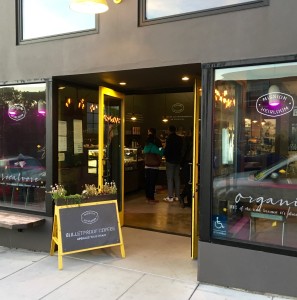Rent control has a long history in the United States. Implemented by various municipalities during WWI and the federal government during WWII, it was initially a means of addressing wartime “housing emergencies” and neither a source of great controversy nor strongly linked to social protest. This changed after the tumult of the 1960s, when a new configuration of “the personal” and “the political” emerged that made our homes into sites of contestation in novel ways. Many began to see rent control not only as a tool for regulating a particular financial transaction but also as a means for asserting community—however loosely defined—against capitalism. In California, this impulse was evident in rent control movements in Santa Monica, Berkeley, Santa Cruz, San Francisco, and—last but not least—Oakland.
Oakland’s best known tenants’ movement culminated in 2002, when housing activists persuaded voters to approve the “Just Cause” ordinance (Measure EE). Though it did not provide rent control, it gave renters crucial protections against arbitrary (“no cause”) evictions. Fights over this statute took place in the shadow of San Francisco’s dot.com boom and, as such, provided a window into Oakland’s unique response to the seismic shifts in regional real estate that it had occasioned.
Oakland was also the location of a remarkable and largely forgotten campaign for rent control in the 1980s, when activists associated with the Uhuru House put two measures on the ballot that would have revolutionized the city’s approach to housing if they had been approved: Measure 0 (1984) and Measure H (1986), two virtually identical initiatives whose purpose was to create a form of socialized housing under the control of decentralized, autonomous “Community Control Housing Boards” that were to be spread throughout the city. Although Oaklanders rejected both by a large margin, they helped define a pivotal moment in the city’s history. They facilitated the emergence of what Adolph Reed has called the “Black urban regime” by prompting established Black leaders to clarify their attitude toward the radical Black movements that had helped put them in power and, secondly, they foregrounded the rich, decentralist alternatives to liberalism that had begun to appear with increasing frequency.
Oakland and Lionel Wilson

The Uhuru House in 2012. The faces on the building’s facade are (from left to right): Marcus Garvey, Kwame Nkrumah, Malcolm X, Huey Newton, and Omali Yeshitela.
The Uhuru House was (and is) headquarters for a constellation of projects led by Omali Yeshitela, a Pan-African, revolutionary socialist who moved from St. Petersburg, Florida to Oakland in 1981. Positioning itself as a liberator of people of African descent worldwide, his group runs an evolving and elaborate network of organizations and businesses. There is the African People’s Socialist Party (its political wing), the African People’s Solidarity Committee (the Party’s White support group), as well as numerous companies that presumably finance the political endeavors (Uhuru Furniture, Uhuru Foods, among others). Like many socialist sects born of the 1960s, the group has a propensity for grandiose rhetoric, which, given its negligible influence on current affairs, suggests an exaggerated sense of self-importance and also that it inhabits a highly idealized political space. Its distance from prevailing political discourse in Oakland was especially conspicuous when it lauded Lovelle Mixon as a hero because he murdered four policemen after a traffic stop in 2008. Continue reading

 The notion that politics only takes place in the voting booth or halls of state basically evaporated in the 1960s. We now know that political acts occur in a range of settings: in our neighborhoods, bedrooms, kitchens, and, yes, even in our gardens.
The notion that politics only takes place in the voting booth or halls of state basically evaporated in the 1960s. We now know that political acts occur in a range of settings: in our neighborhoods, bedrooms, kitchens, and, yes, even in our gardens. I didn’t watch last night’s fight (although I did talk about it with a bunch of my neighbors on the street while walking my dogs). I could have watched it for $25 at the soul food place at the end of my block (with some food included), but the thought of giving these billionaires even more money turned me off completely.
I didn’t watch last night’s fight (although I did talk about it with a bunch of my neighbors on the street while walking my dogs). I could have watched it for $25 at the soul food place at the end of my block (with some food included), but the thought of giving these billionaires even more money turned me off completely.


 Oakland’s recent history is rich in contradictions. When voters elected Lionel Wilson—the city’s first Black and Democratic mayor—in 1977, they took a decisive step in the ouster of the white, Republican, pro-business regime that had run Oakland as an exemplar of American municipal apartheid for decades. Wilson’s ascendency was part of a vast transformation in the composition of local political elites, who now largely reflect the political and racial background of the population that they govern. Indeed, since then, most of Oakland’s mayors have been “minorities,” all have been Democrats, and several have had roots in social movements. Similar claims can be made about those who have occupied the posts of City Manager, Chief of Police, Economic Development Director, and Port Director, to cite only the most significant positions. In many respects, there was a revolution in city affairs, one that we can analogize, with some justice, to the 1994 defeat of apartheid in South Africa.
Oakland’s recent history is rich in contradictions. When voters elected Lionel Wilson—the city’s first Black and Democratic mayor—in 1977, they took a decisive step in the ouster of the white, Republican, pro-business regime that had run Oakland as an exemplar of American municipal apartheid for decades. Wilson’s ascendency was part of a vast transformation in the composition of local political elites, who now largely reflect the political and racial background of the population that they govern. Indeed, since then, most of Oakland’s mayors have been “minorities,” all have been Democrats, and several have had roots in social movements. Similar claims can be made about those who have occupied the posts of City Manager, Chief of Police, Economic Development Director, and Port Director, to cite only the most significant positions. In many respects, there was a revolution in city affairs, one that we can analogize, with some justice, to the 1994 defeat of apartheid in South Africa. Chuck Morse is an American anarchist, academic, translator, editor, and writer. He founded the Institute for Anarchist Studies and The New Formulation: An Anti-Authoritarian Review of Books. Morse was the editor of Perspectives on Anarchist Theory and taught at theInstitute for Social Ecology.
Chuck Morse is an American anarchist, academic, translator, editor, and writer. He founded the Institute for Anarchist Studies and The New Formulation: An Anti-Authoritarian Review of Books. Morse was the editor of Perspectives on Anarchist Theory and taught at theInstitute for Social Ecology.
 Murray Bookchin was a pivotal, polarizing figure in the post-WWII history of anarchism. He put ecology and democracy on the anarchist agenda in a way that was as novel as it is enduring. As a polemicist, he spent decades at the center of crucial debates about history, strategy, and foundational ideals. Even his critics must acknowledge that he made major contributions to the growth and clarification of the anarchist perspective.
Murray Bookchin was a pivotal, polarizing figure in the post-WWII history of anarchism. He put ecology and democracy on the anarchist agenda in a way that was as novel as it is enduring. As a polemicist, he spent decades at the center of crucial debates about history, strategy, and foundational ideals. Even his critics must acknowledge that he made major contributions to the growth and clarification of the anarchist perspective.